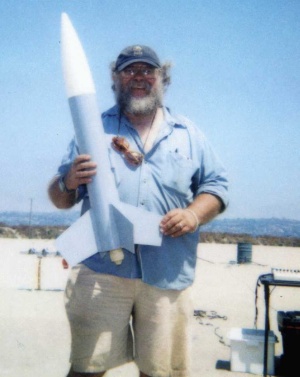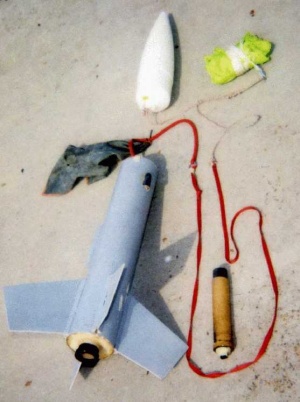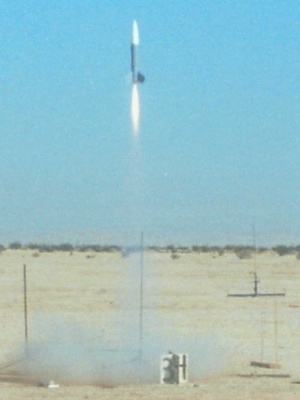Scratch Chopped Goblin 4.0 Original Design / Scratch Built
Scratch - Chopped Goblin 4.0 {Scratch}
Contributed by Larry Brand
| Manufacturer: | Scratch |

Brief:
I built a 4" diameter upscale of the old Estes Goblin that is very similar
to the "3x Goblin" Dave Hanson reported on this website a few years
ago. I used it for my L1 flight. I decided to repair some minor zipper damage
by cutting the main body tube down from 27" to 22", and in the
process, I found that the result is a better flyer, probably due to lower drag.
Construction:
Components are generally similar to the Dave Hanson version:
- 4" LOC nose cone
- 22" long piece of LOC 3.9" tubing
- 4" coupler tube
- 14" x 38mm LOC motor tube
- 2 3/16" x 4" plywood centering rings
- 2' x 3' sheet of 1/8" LitePly and balsa triangle stock for the fins
- 1/2" x 6' PETCO nylon dog leash with 18" choke collar for shock cord
- 36" Top Flite nylon parachute
- 38mm Aero Pack retainer
To create a fin template, first draw a rectangle 6" x 1 1/4". On the upper left corner, construct a right-leaning line 7 1/4" long 30 degrees from the vertical. On the upper right corner, construct a right-leaning line 4 3/4" long 15 degrees from the vertical. Connect the ends of these lines. You now have a full-size template with a through-the-wall tab that reaches the 38mm motor tube.
 Five-minute epoxy was used throughout the build. I first built a solid fin can
by gluing one of the centering rings 1" from the bottom of the motor tube,
then gluing the four LitePly fins to the motor tube. Finally, I slid the upper
centering ring onto the motor tube and epoxied it to the top of the fin tabs
and the motor tube. Four 6" deep slits are marked on the bottom of the
body tube to match the fin locations of the fin can, and cut into the tubing
3/16" wide with a fine blade in an electric saber saw. The assembled fin
can was then slathered with epoxy and pushed into the slots. Strips of balsa
triangle stock 6" long were added to the base of each fin. A 4" epoxy
coated coupler tube was then forced down the top of the body tube to lock the
fin can in place. Recovery system was attached to a 7" loop of para cord
that had been passed through a 1/8" hole in the hull 5" from the top,
with the knot in the loop covered by a piece of a plastic cigar tube and epoxy.
A 36" Top Flite chute and small-sized Nomex®
protector complete the recovery system. A launch lug cut from 4" of an
empty cigar tube is glued with its midpoint 7" from the top of the fin
can. An Aero Pack retainer was attached according to the manufacturer's
instructions.
Five-minute epoxy was used throughout the build. I first built a solid fin can
by gluing one of the centering rings 1" from the bottom of the motor tube,
then gluing the four LitePly fins to the motor tube. Finally, I slid the upper
centering ring onto the motor tube and epoxied it to the top of the fin tabs
and the motor tube. Four 6" deep slits are marked on the bottom of the
body tube to match the fin locations of the fin can, and cut into the tubing
3/16" wide with a fine blade in an electric saber saw. The assembled fin
can was then slathered with epoxy and pushed into the slots. Strips of balsa
triangle stock 6" long were added to the base of each fin. A 4" epoxy
coated coupler tube was then forced down the top of the body tube to lock the
fin can in place. Recovery system was attached to a 7" loop of para cord
that had been passed through a 1/8" hole in the hull 5" from the top,
with the knot in the loop covered by a piece of a plastic cigar tube and epoxy.
A 36" Top Flite chute and small-sized Nomex®
protector complete the recovery system. A launch lug cut from 4" of an
empty cigar tube is glued with its midpoint 7" from the top of the fin
can. An Aero Pack retainer was attached according to the manufacturer's
instructions.
Finishing:
Rocket was painted flat light aircraft gray.

Flight:
First flight was on an G80-4 and LOC 29mm-38mm adapter. Subsequent flights were
with CTI H143SS-8 and CTIH153-8 motors. The rocket had flown earlier on an
H123W-S in its longer version.
Most powerful motor tested was a single use Ellis Mountain I134-10 motor, which simmed out to 3100' and 390 mph. I added about 300g sand ballast to the cone base as "insurance" on this motor. Ejection was spot on respecting apogee. The 597 N-sec I134-10 is a perfect motor for the Chopped Goblin if you have enough space.
Summary:
PRO: Fast building and a better performer than the "full-length"
version. Flies on G-H-I power. Good L1 rocket and stays below the 1500g AUW
maximum for Large Model Rockets (restricted size fields) when using H123 motor
for certification.
CON: Minimum motor size for this version is G80-4, so needs to fly in HPR category.
 |
 |